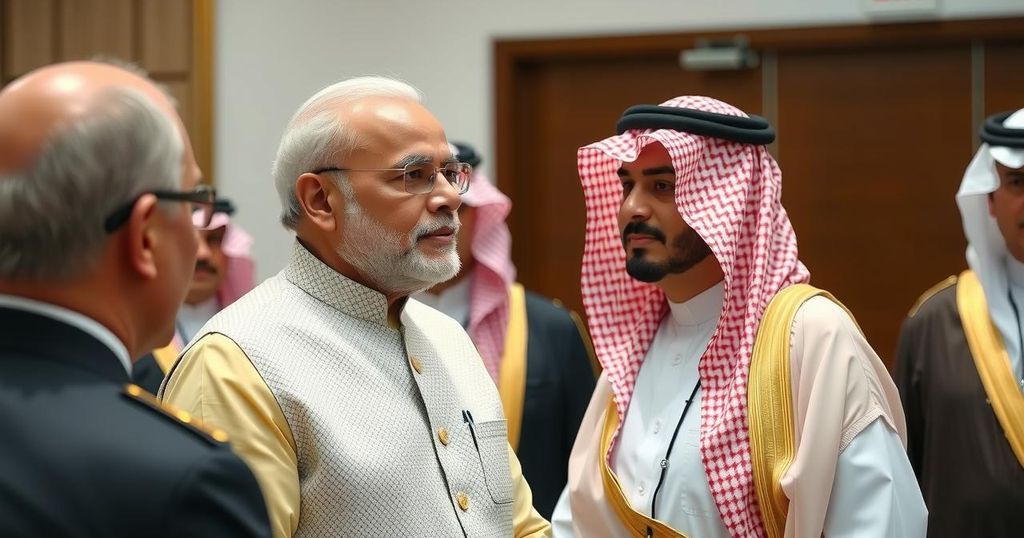Highlights from PM Narendra Modi’s Landmark Visit to Kuwait

Prime Minister Narendra Modi visited Kuwait for the first time in 43 years, focusing on strengthening bilateral ties, highlighting labor welfare, and engaging with the Indian diaspora. Key highlights included a visit to a labor camp, a large diaspora gathering, and discussions on diversifying non-oil trade. Modi’s tour emphasizes cultural diplomacy and strategic economic partnerships between India and Kuwait.
Prime Minister Narendra Modi embarked on a significant two-day visit to Kuwait, marking the first visit by an Indian leader to the Gulf nation in 43 years. His trip is primarily aimed at enhancing bilateral relations, diversifying non-oil trade, and recognizing the contributions of the Indian diaspora. Key highlights from the first day included a warm welcome from Kuwaiti officials, a visit to a labor camp emphasizing worker welfare, and a strong focus on cultural diplomacy, culminating in a gathering with the Indian expatriate community.
Upon his arrival, PM Modi was received by Sheikh Fahad Yousef Saud Al-Sabah and a host of dignitaries. His first engagement addressed the welfare of Indian workers at a labor camp in Mina Abdullah, wherein he assessed their living conditions. Modi’s discussions with Abdullah Al Baroun and Abdul Lateef Al Nesef—who have translated significant Indian texts into Arabic—reinforced cultural ties. Furthermore, a poignant moment occurred when PM Modi honored the request from the granddaughter of a 101-year-old former diplomat to meet him, showcasing his dedication to engaging with the diaspora.
Later in the day, PM Modi participated in the ‘Hala Modi’ event, reminiscent of the ‘Howdy Modi’ gathering in the United States, where he acknowledged the deep-rooted contributions of the Indian community in Kuwait, which he described as a ‘mini-Hindustan.’ He highlighted their integral role in enhancing relations between India and Kuwait, further expressing gratitude to the Kuwaiti leadership for their positive policies towards the Indian populace.
The Prime Minister was also honored as the ‘Guest of Honour’ at the opening ceremony of the 26th Arabian Gulf Cup, where an informal meeting was held with key leaders, setting the stage for more formal discussions regarding bilateral cooperation in crucial areas such as defense, trade, investment, and energy. In interviews with local media, PM Modi stressed the importance of diversifying trade into non-oil sectors including pharmaceuticals, technology, and digital innovation, asserting India’s role as a reliable partner advocating for the Global South’s development.
In summary, PM Modi’s first day in Kuwait underscored a commitment to strengthening bilateral ties through cultural engagement and addressing the welfare of the Indian community. His emphasis on non-oil trade diversification reflects a strategic shift towards sustainable economic partnerships.
The visit of Prime Minister Narendra Modi to Kuwait is of historical significance as it marks the first official visit by an Indian leader to the Gulf nation in over four decades. The Indian diaspora in Kuwait is notably large and plays a vital role in the social and economic landscape of the country, prompting discussions on labor welfare and cultural integration. This visit aims to bolster India’s engagements with Gulf nations, particularly in trade and investment realms, while advocating for broader cooperation in sectors beyond oil, such as healthcare, technology, and climate action. Additionally, it reflects India’s commitment to its Global South partnerships, positioning itself as a proactive participant in addressing shared challenges.
In conclusion, Prime Minister Narendra Modi’s visit to Kuwait initiated a pivotal chapter in Indo-Kuwaiti relations, emphasizing the importance of cultural diplomacy, labor welfare, and economic diversification beyond oil. The warmth of reception and key interactions with the Indian diaspora highlight the community’s impactful presence in Kuwait society. As the discussions progress into formal talks, the focus on areas like defense and trade underscores India’s intent to solidify partnerships in the Gulf region, affirming its position as a leader in advocating sustainable development for the Global South.
Original Source: www.indiatoday.in








